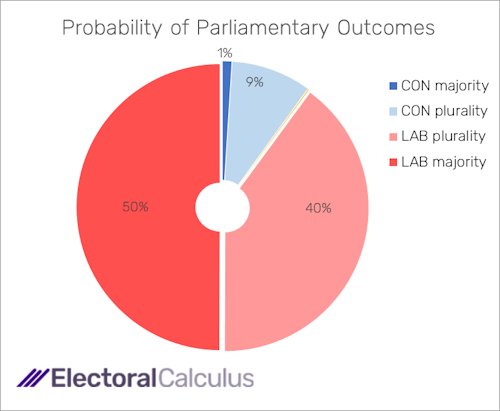The Tory MPs running for the party's leadership are subject to a single pressure: they must appeal to the party faithful in order to become party leader. However, whoever becomes leader of the opposition will be pulled two ways: he or she must also appeal to the British electorate.
Keeping faith with the faithful is not enough to enable the party to recover from the worst electoral defeat in its history. Labour, after six weeks of negative headlines, is down four percentage points in the polls from its general election level of support. However, Conservative support is only up a measly one-tenth of one percent.

Without gaining electoral support the Conservatives will have up to three dozen seats fall into their hands which Labour took from the party by a narrow margin in July. This is not enough to bring Tory MPs up to the level that three different leaders achieved during 13 years in opposition between 1997 to 2010.
The Reform Party is the immediate gainer from Labour's slump. September polls show it up 3.6 percent from its July result. Electoral Calculus estimates this would gain it four seats, all of them from Labour. This is a reminder that Reform's appeal is that of an anti-establishment party and Labour is now the establishment party.
The new Tory leader will find it doubly difficult to compete with Nigel Farage as the anti-establishment leader. The Tory leader will be burdened with the title and responsibilities of the Leader of His Majesty's Opposition. Moreover, he or she will be burdened with a record established over 14 years of government, and then rejected by three-quarters of the electorate.
There is a superficial logic for the new party leader to be pulled in the direction of the Reform Party's policies on immigration and on lower taxes. This could not gain many seats from Reform, since it has only a handful of MPs, but it could tip some Labour seats to the Conservatives. The size of the gain would be small, since Reform finished a weak third or fourth in these seats.
To restore the Conservatives as an electorally credible party of government the new Tory leader must follow voters toward the centre, because the hundreds of seats needed to get into Downing Street are held by the Liberal Democrats and Labour.
In the 72 seats that the Liberal Democrats now hold, most were won thanks to Conservative defectors and the Tories are now second in 64 of these seats. If the Conservative leader criticised Labour's shortcomings without invoking Reform themes that could encourage ex-Tories to return from the Liberal Democrats and from Labour. That is unlikely to deliver enough MPs to enable the new leader to become a Conservative Prime Minister by 2029. But it could reduce the number of electoral defeats that Tory leaders must suffer before one of them has the good fortune to enter Downing Street.
Prof Richard Rose, University of Strathclyde, is Britain's senior election expert. He has been writing about elections at home and abroad since 1959.